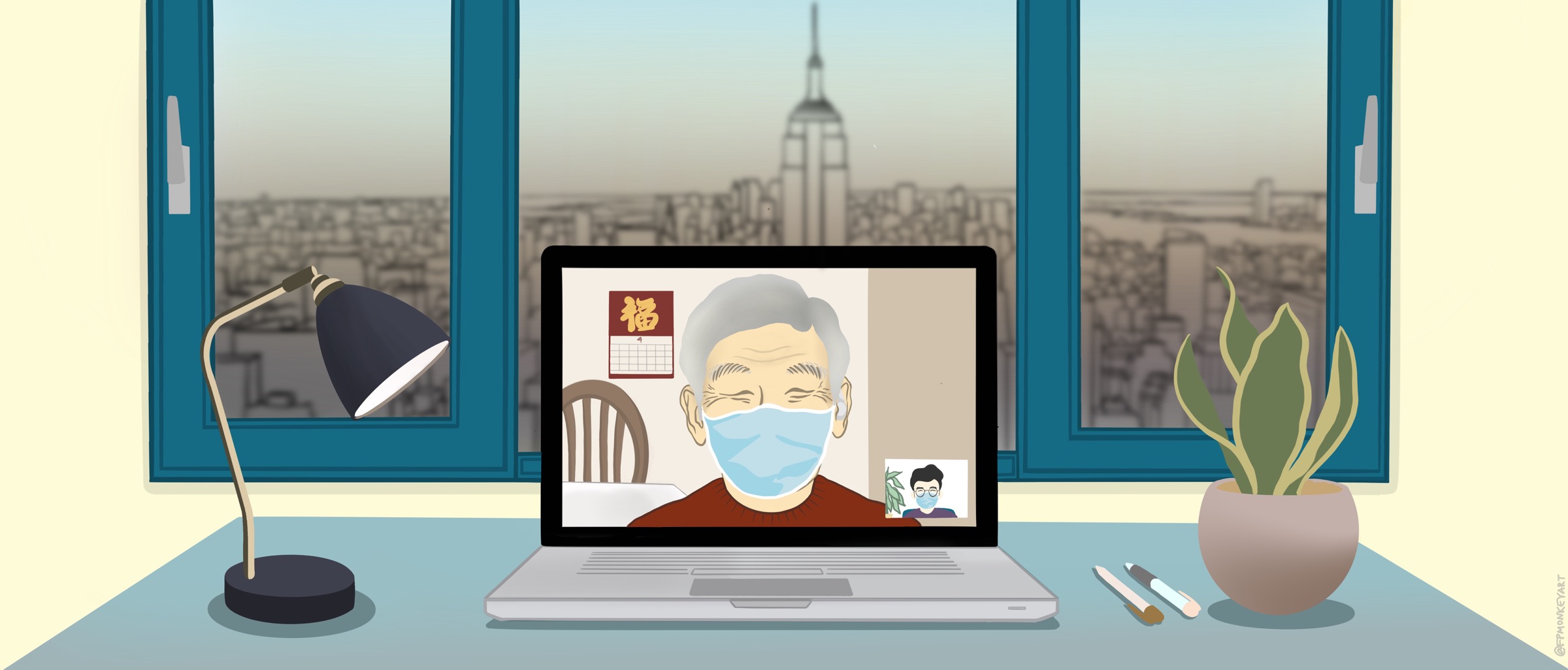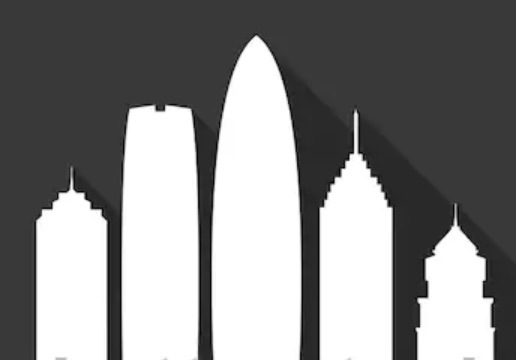My family survived the lockdown in Wuhan. Now it’s my turn, in New York

Illustration by Julia YH

For a long time, I thought I was the only lucky one in my family to have escaped the lockdown in Wuhan.
Wuhan is the only city I call home. I lived there all my life before going to Beijing for college and then moving to New York. My parents and my 82-year-old maternal grandfather still live there. On January 23, when that sprawling metropolis was put under lockdown to contain the spread of the novel coronavirus, my family found themselves trapped along with millions of others, including those who had returned for the weeklong Chinese New Year holiday.
Thousands of miles away in New York, I could only attend my family’s New Year’s Eve dinner through video. Because of travel restrictions, it wasn’t as big a table as in the past. After showing off the dishes, my mother said to me, “It’s good that you didn’t come home this year.”
In the weeks that followed, I decided the only thing I could do was to check on my family with regularity. On the phone, I told my parents, over and over, to wear masks and wash their hands. In contrast to my anxiety, they assured me in a cheerful tone that they were doing well.
These calls kept me sane. Despite being in the center of an unthinkable situation, my family kept themselves well-fed and even entertained. My father was appointed the family chef for every meal, while my mother made full use of her prolonged time off work to take online English classes and do thorough house-cleaning.
Still, there were moments on the phone when I got a sense of how their lives were disrupted. My grandpa is hard of hearing and relies on hearing aids to conduct even basic conversations. Five days into the lockdown, my mother realized they were running out of his special batteries. She had ordered some online, but they never arrived because the freight transport into Wuhan had been cut off except for emergency supplies.
“In a few days, grandpa won’t be able to hear anything at all,” she told me during a call in February.
I couldn’t utter a response. The possibility of my grandpa sinking into a world of silence when he was already cut off from everything outside our apartment was just too sad. After the call, the very thought continued to haunt me for weeks, until I encountered a bigger problem.
On March 3, I sensed the first hint of fear in New York. The second confirmed case in the state was someone who hadn’t traveled abroad, a clear sign that community spread was already taking place here. After that, the development unfolded as if on fast-forward. Six days later, Columbia University suspended all on-campus classes. I had planned for months to fly to Nepal in mid-March for my Master’s research, but it was canceled at the last minute.
And then, all of a sudden, the entire country buckled under COVID-19. The NBA suspended its season on March 11; public school students were all sent home; Americans came to the realization that they were now in the center of a pandemic.
As of this moment, New York City has more than 81,000 confirmed cases and 4,500 deaths, both surpassing the official numbers in Wuhan and still growing. On March 22, exactly two months after Wuhan, New York implemented a stay-at-home order, asking every non-essential worker to stay indoors and threatening to fine those who don’t oblige. As it turns out, I avoided one lockdown — and one national epicenter — only to end up in another.
During the day, we are bound by the walls of our apartments, trying to live life remotely, through conference calls or virtual classrooms. At night, we worry about the safety of ourselves and those around us. Two of my friends in New York suspected they had it but pushed through the fatigue and fever at home without getting tested. The danger seems so close.
Scarcity has been an issue, but I am fortunate because the hoarding gene runs deep in my family. When my friends began to experience a shortage of facemasks, I didn’t panic because I still had the masks I bought last year when I caught the flu. During the Wuhan lockdown, my family wasn’t allowed to go out for groceries but they assured me the frozen meat in our fridge could easily last for two months.
While my family and I have experienced — are experiencing — the same restrictions and frustrations on opposite sides of the Pacific, there is one profound difference: the future.
Wuhan has fought a long, hard battle with the disease, and it’s almost near the end of its current chapter. The volunteer medics from other cities have finished their work and left, the makeshift quarantine facilities have been shut down, and as of yesterday, the city’s border has reopened, along with the airport, train stations, and highways (even though movement is still discouraged).
My mother and father have both returned to their offices. A week ago, my father and grandfather also got their long-awaited haircuts. On their way home, they bought some jìcài 荠菜 — shepherd’s purse — to celebrate the lunar March 3 Festival, a tradition I grew up with. Life is slowly but promisingly coming back.
But in New York, the future remains unclear. Day and night, ambulances roar down the avenue by my window. Another 200-bed field hospital will be erected in the Bronx in three weeks to treat COVID-19 patients. Everyone is hoping that the curve-bending moment has arrived, but no one knows for sure. When I tell my parents what’s happening here, they tell me how similar it sounds to Wuhan in the early days.
Because of our mismatching timelines, my family and I have also exchanged places as far as who worries about whom.
Now, my mother pesters me with calls every other day, checking whether I have gone out, similar to what I did to them earlier. The other day, I sent them a photo of a Korean-style hotpot I made. My mother was immediately skeptical. “This doesn’t look like it was cooked by you. Are you eating outside?” I took it as a compliment.
I have to admit, the frequency of the calls can be a bit much, but I understand: it’s my turn to relieve them of their worries.
And truth be told, our conversations give me hope. Whenever I talk to my American friends, I make an effort to tell them that my family in Wuhan is walking out of the lockdown. “This is probably the best news I’ve heard today,” one of my professors said upon hearing that.
Yesterday morning, the first day after the lockdown ended, there were already traffic jams, my mom tells me. Yangtze River Bridge, vital to in-city travel, has already begun limiting traffic based on license plate numbers. It’s as if the once-bustling city of 11 million, the most populous in central China, is stirring back to life.
It’s a slightly different life, though, one with ubiquitous temperature checks and health code scans: leaving the community, getting on the subway, going into a restaurant, etc. “To be honest, I wish I were staying at home,” my mother said in a recent conversation, much to my surprise. Her office is cold now because she’s not allowed to turn on the central AC system for heating. Commuting in the city also means she’s exposed more than ever.
“But being stuck at home wasn’t very pleasant either,” she added.
She did give me one piece of good news: While confined indoors and battling boredom, my grandfather had magically found two packs of unused batteries in the deepest corner of his closet. His hearing will be preserved for at least another month. By then, the delivery services should have resumed, people should be greeting each other outside, and everything in Wuhan should have returned to some semblance of normal.
I hope we can say the same about New York.






